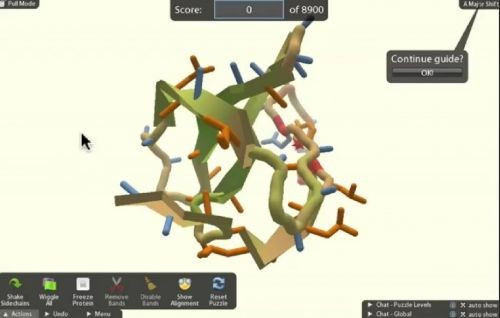Gamers Decipher Mystery in Quest for HIV Cure

Online game players deciphered the molecular structure of the enzyme of a virus that belongs to the same family as HIV, something that had baffled scientists for more than a decade.
Such a breakthrough could help to develop drugs to fight the human immunodeficiency virus (HIV) that causes AIDS, the University of Washington said.
Through playing a game known as Fold-It, gamers solved the puzzle in three weeks generating models of the protein-cutting enzyme from an AIDS-like virus, according to a study published Sunday in the journal Nature Structural & Molecular Biology.
"These features provide exciting opportunities for the design of retroviral drugs, including AIDS drugs," the authors of the study wrote.
Scientists explained that the class of enzymes called retroviral proteases are key to understanding how the HIV matures and proliferates.
The knowledge on the molecular structure is essential to developing anti-HIV drugs that block these enzymes.
Microscopes give only a flat image of the enzyme but pharmacologists need a 3-D image that "unfolds" the molecule and rotates in order to reveal potential targets for drugs, reports AFP.
"We wanted to see if human intuition could succeed where automated methods had failed," said Dr. Firas Khatib of the University Of Washington Department Of Biochemistry.
"People have spatial reasoning skills, something computers are not yet good at," said Dr. Seth Cooper, of the UW Department of Computing Science and Engineering and co-creator, lead designer and developer of Foldit.
How Does Fold-it Game Work?
Fold-it was developed in 2008 by computer scientists at the University of Washington in collaboration with the Baker Laboratory to team online gamers to unfold chains of amino acids, the building blocks of proteins.
Players come from all walks of life. The game taps into their 3-D spatial abilities to rotate chains of amino acids in cyberspace. New players start at the basic level, "One Small Clash," proceed to "Swing it Around" and step ahead until reaching "Rubber Band Reversal", according to UW.
Puzzling together the shape and misshape of proteins contributes to research on causes of and cures for cancer, Alzheimer's, immune deficiencies and a host of other disorders, as well as to environmental work on bio fuels, UW said in a released statement.
“The results in this week's paper show that gaming, science and computation can be combined to make advances that were not possible before", Dr. Cooper said.
"The ingenuity of game players," Khatib said, "is a formidable force that, if properly directed, can be used to solve a wide range of scientific problems."



























